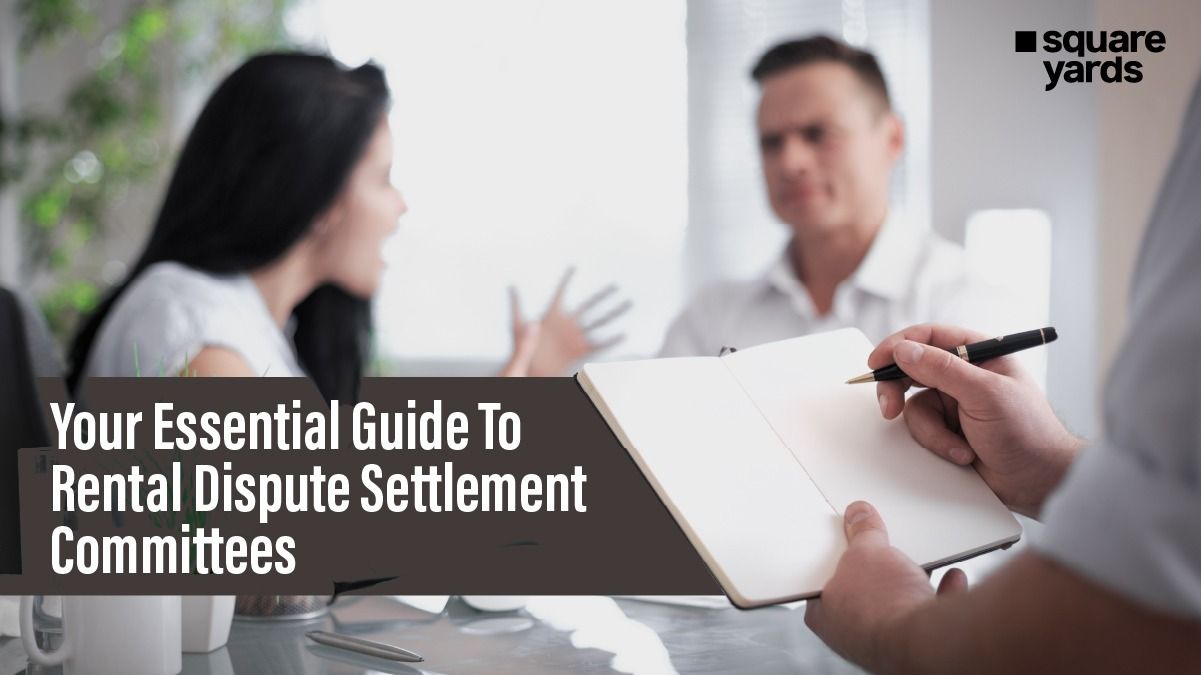The government of Abu Dhabi is the regulatory body that oversees the real estate market and other related matters. Whether you are just exploring the market or out here to invest in an apartment, you ought to abide by the law. Even with the best-managed arrangements, disagreements can still occur; hence, you require a strong conflict-resolution process. The Abu Dhabi Rental Dispute Settlement Committees are involved in this situation. The Committee is responsible for settling rental conflicts between landlords and tenants.
Let us examine the governance and function of the Abu Dhabi Rental Dispute Committee in detail to better understand its work and agreements.
What are the Rental Dispute Settlement Committees?

The Rental Dispute Settlement Committees in Abu Dhabi, or RDSC, is a specialised judicial body designed to resolve disputes between landlords and tenants efficiently. Governed by the Abu Dhabi Judicial Department, the RDSC ensures fairness and legal compliance in rental agreements and supports both parties in achieving amicable resolutions.
What is RDSCS, and their Area of Authority?
The Abu Dhabi Rent Dispute Settlement Committee operates under the comprehensive framework of Abu Dhabi’s property laws. Its jurisdiction covers a wide range of rental disputes, including, but not limited to, payment issues, service charges, and eviction matters. This jurisdiction ensures that all cases are handled within the legal boundaries set by Abu Dhabi rental law, providing a structured process for dispute resolution.
Who Is Eligible To Submit A Complaint?
Any tenant or landlord involved in an Abu Dhabi rental agreement can file a complaint with an RDSC. This includes individuals and businesses facing issues related to their rental contracts. The committee accepts complaints backed by relevant documentation and ensures all parties receive a fair hearing.
How To File A Complaint?
After gaining a keen understanding of Abu Dhabi tenancy disputes, let us proceed with filing a complaint with the RDSC.
- Examine the problem and list the issues between the tenant and the landlord.
- Visit the Rental Dispute Settlement Centre at 16 Al Nawfal Street, Al Rawdah.
- Complete the complaint form thoroughly with the correct information and send it in with all required documents (listed below).
- Make a payment of the mentioned amount.
- Present the case and attend the hearings; Comply with the judgments passed by the Rental Dispute Settlement Committees.
- Hearings and Procedures
Both parties present their cases during hearings, supported by their documents and arguments. The RDSC evaluates the information provided and facilitates a dialogue to resolve the issue. If mediation fails, the committee proceeds to make a formal judgment.
Other Requirements For Filing The Complaint
Besides the procedures mentioned above, consumers must also consider the following requirements related to RERA dispute resolution.
-
Fees
The Rental Dispute Settlement Committees Abu Dhabi rental fee is 4% of the annual rent, a maximum of AED 10,000.
-
Documents
The documents below are needed to submit the complaint to the Rental Committee. However, the Committee might request more documents.
- 2 Copies of the Tenancy Contract
- Original Rental Dispute Settlement Committee application
- Copy of Emirates ID/Passport
- Trade Licence, in case of business
- Original Power of Attorney (In case someone else represents the complainant)
Categories of Disputes Addressed by Abu Dhabi Rental Dispute Committee

The Abu Dhabi Rental Dispute Committee handles various types of disputes, from simple rent disagreements to more complex cases involving property damage or breaches of lease terms. They also handle cases involving rent increases, maintenance disputes, and the return of security deposits. Each case is assessed on its own merits, and decisions aim to uphold the rights of all parties involved under Abu Dhabi rental law.
Benefits of Using Rental Dispute Settlement Committees (RDSCs)
Abu Dhabi’s Rental Dispute Settlement Committee benefits both landlords and tenants. It guarantees that all parties are handled equitably, expedites the resolution process, and lowers possible litigation costs. This specialised committee promotes a safe real estate environment by efficiently managing various issues.
-
Streamlined Method and Lowered Costs
The RDSC provides a structured and clear dispute resolution procedure, significantly reducing the time and costs associated with traditional court cases. With fees capped and a systematic approach to handling cases, parties involved can resolve disputes without enduring prolonged litigation or incurring hefty legal fees.
-
Fair and Expeditious Solutions
One of the committee’s main benefits is its focus on resolving Abu Dhabi tenancy disputes fairly and quickly. The committee uses clear arbitration and mediation processes to make decisions without delays. This is important for maintaining good relationships between landlords and tenants and maintaining the integrity of Abu Dhabi’s rental market.
-
Inclusivity and Ease of Use
The RDSC is easy to use, making it simple for anyone with a rental issue to file a complaint. Clear guidelines on what documents are needed and how to file a complaint make the process straightforward. This encourages more tenants and landlords to use the system and protect their rights under Abu Dhabi’s rental laws.
Key Considerations for Tenants and Landlords
Both tenants and landlords should keep records of all transactions and communications. Knowing the details of the rental agreement and the laws regarding renting in Abu Dhabi can help resolve Abu Dhabi tenancy disputes easily.
-
Significance of Effective Communication and Record-Keeping
Effective communication and thorough documentation can prevent misunderstandings and provide clear dispute evidence. Documenting all agreements and amendments resolves issues before they escalate to formal complaints.
-
Understanding Your Rights and Obligations under Law
Both parties must understand their legal Abu Dhabi rental rights and obligations. Knowledge of Abu Dhabi rental law is crucial for navigating disputes and protecting one’s interests effectively in any rental disagreement.
-
Seeking Legal Advice When Required
While the RDSC is equipped to handle most rental disputes, complex cases require professional legal advice. Consulting with a legal expert can provide strategic guidance and a better understanding of the nuances of the law.
Guidelines for a Seamless Renting Experience
Below are some tips that help ensure a smooth RERA dispute resolution process. This structured approach will help manage rental disputes and maintain professional and cordial relationships between owners and renters.
-
Choosing a Reputable Real Estate Agent
Selecting a reputable real estate agent is crucial in Abu Dhabi. A good agent ensures compliance with local regulations and facilitates smooth transactions. Look for agents with positive reviews, transparent practices, and a solid understanding of the Abu Dhabi property market.
-
Thoroughly Reviewing and Understanding the Tenancy Contract
Before signing, thoroughly review and understand every clause of your tenancy contract. Clarifying rent payments, maintenance responsibilities, and lease termination terms helps prevent future disputes. Ensure any verbal agreements are in writing.
-
Maintaining Open and Respectful Communication with Your Landlord/Tenant
Open and respectful communication forms the basis of a healthy tenant-landlord relationship. Discussing maintenance, rent changes, and contract renewals can prevent misunderstandings and foster mutual respect.
Resources and Further Details
Please find some important links and resources below to connect with the Abu Dhabi Dispute Settlement Committee.
- Abu Dhabi Judicial Department Website: A primary resource for legal regulations and dispute resolution procedures. (https://www.mediaoffice.abudhabi/en/topic/abu-dhabi-judicial-department/)
- RERA Website: Provides detailed information on real estate regulations in Abu Dhabi. (https://dubailand.gov.ae/en/rera )
- Local Real Estate Agents and Legal Consultants: Engaging with experts can provide tailored advice and help navigate complex situations.
To Sum It Up
Finding your way through rental agreements in Abu Dhabi can be a breeze once you know a few key things! It’s all about getting familiar with the local laws, choosing the right real estate professionals to help you, and keeping communication lines open. By tapping into available resources and understanding your legal responsibilities, you’ll set yourself up for a fantastic tenancy experience.
Similar Suggestions For You:
|
Explore the Abu Dhabi Residential Rental Index |
|
|
About real estate agents in Abu Dhabi |
|
|
Obtaining a Property Valuation Certificate in Abu Dhabi |
|
|
Know About the Estidama Pearl Rating System |
Frequently Asked Questions (FAQ’s)
Depending on the nature of the dispute and the judgment passed by the Rental Dispute Settlement Committee, legal implications can include penalties, eviction, or financial restitution.
Landlords are responsible for maintaining the property in good condition, adhering to the terms of the tenancy contract, and not arbitrarily increasing rent.
The resolution time can vary but typically involves several weeks to a few months, depending on the dispute's complexity and the efficiency of the RDSC process.
Common disputes include disagreements over rent increases, maintenance responsibilities, and the return of security deposits.
Building a good relationship involves clear communication, understanding each party’s rights and responsibilities, and promptly and respectfully addressing issues.
Landlords can evict tenants who violate contract terms, such as non-payment of rent, illegally using the property, or causing significant damage. Still, they must follow the legal processes outlined by Abu Dhabi rental law. What are the legal implications of rental disputes in Abu Dhabi?
What are the responsibilities of landlords in Abu Dhabi?
How long does it take to resolve a rental dispute in Abu Dhabi?
What are the common rental disputes in Abu Dhabi?
How can I build a good tenant-landlord relationship?
Can landlords evict tenants during the tenancy period?




